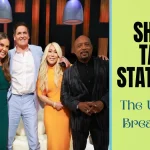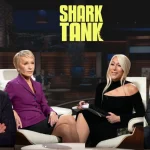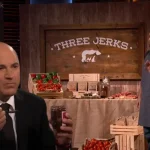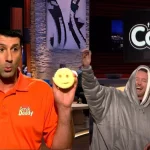Beyond the Tank Episode 206
 Beyond the Tank episode 206 aired Friday, May 20, 2016 and is the final episode of “season two.” With the success of the show, we can only assume there will be a season three! Three past Shark Tank businesses get in-depth updates on their life after dealing with Sharks. Beyond the Tank episode 206 features Pork Barrel BBQ from season one, one of the first businesses Barbara (or any Shark) invested in. Season four’s CordaRoys, the beanbag/bed business Lori bought into in season four, highlights their rapid growth since jumping in the Tank. HoneyFund, the crowd-funding honeymoon site Mr. Wonderful invested in during season six, has Kevin O’Leary in fits over their new business model.
Beyond the Tank episode 206 aired Friday, May 20, 2016 and is the final episode of “season two.” With the success of the show, we can only assume there will be a season three! Three past Shark Tank businesses get in-depth updates on their life after dealing with Sharks. Beyond the Tank episode 206 features Pork Barrel BBQ from season one, one of the first businesses Barbara (or any Shark) invested in. Season four’s CordaRoys, the beanbag/bed business Lori bought into in season four, highlights their rapid growth since jumping in the Tank. HoneyFund, the crowd-funding honeymoon site Mr. Wonderful invested in during season six, has Kevin O’Leary in fits over their new business model.
What have these companies been up to since first partnering with a Shark? Find out on Beyond the Tank!
Beyond the Tank Episode 206 Featured Sharks
- Investor – Lori Grenier
- Investor – Barbara Corcoran
- Investor – Kevin O’Leary
Beyond the Tank Episode 206 Entrepreneurs
- Company – CordaRoys
- Company – HoneyFund
- Company – Pork Barrel BBQ
Beyond the Tank Episode 206 Recap
Honeyfund
Sara and Josh Margulis came to Shark Tank in season 6, with their business, Honeyfund. The site allows couples to register for monetary gifts, to allow them to raise money toward their “dream honeymoon.” The site had, when the couple appeared on the show, raised over $2 million for their clients. They were examining the idea of expanding into other life-events people would want to raise money for, like graduation or anniversaries. Kevin O’Leary made an offer. He wanted 1/3 of their transaction revenue, until he recouped three times his investment. The Margulises accepted.
“I invested in Honeyfund,” says Kevin, “because it provides a platform that allows people to invest in other people’s romances, and they make money. Love and money. It’s perfect.”
After their Shark Tank appearance, Honeyfund’s membership rose by 245% and page views doubled. The couple used the investment to expand their sister site, Plumfund, a site that allows people to raise money for other, non-wedding related needs.
Unfortunately, Plumfund is not yet turning a profit, and the profits from Honeyfund are going into supporting the new site. The couple is reluctant to give up on their new venture.
“It’s really great to see people rally around others by using Plumfund,” says Josh. “That’s why we don’t want Plumfund to wither away. We want it to succeed and to help those people who need it.”
Honeyfund has three sources of income: Upgraded, paid memberships, transactional revenue, and partnerships- advertisers who have bought into the site. While they’ve been growing Plumfund, in part, by converting Honeyfund users, they feel growth isn’t happening fast enough, and they have a proposition for Kevin.
At the meeting, they present the basics of Honeyfund’s revenue stream, and talk about Plumfund’s purpose and lack of profitability. Kevin is sympathetic with the couple’s dilemma, but realistic.
“Look,” he says, “I appreciate the enthusiasm you have for it, and the passion, but it’s either a business or it’s a charity. Right now, it’s a charity. It’s great that you’ve created this platform, but if you want it to sustain itself, it’s got to make money. Otherwise, you’ve taken a successful business, in the profits from Honeyfund, and put it into the ground with Plumfund.”
He recommends that they give Plumfund one more year to become profitable. The couple reveals their idea to vitalize Plumfund. In the upgraded memberships, which make up roughly 60% of Honeyfund’s revenue, there is an “Elite” level that brings customers up to 58% more revenue with their fundraisers.
“So, right now,” says Josh, “What we’re proposing to do is to give all of our Honeyfund customers, the ability to have the complete customization of their page, they all have Honeyfund Elite, free of charge.”
Not surprisingly, Mr. Wonderful’s response is less than wonderful.
“What the… What are they thinking?” he rants. “Take 60% of your revenue and cancel it to zero?”
The couple believes that the removal of fees for the upgraded memberships will drive enough traffic to build transactions and partnership revenues, making up for the loss of the membership revenues.
O’Leery’s not entirely convinced. “I love cash,” he says. “I start to cry when I see it go away. And that’s what’s happening with Honeyfund. We’re taking risks with my cash flow, because I don’t know the outcome yet, and neither do they. They’re sure it’s going to work. I’m not.”
Sara’s not ready to give up.
“Kevin,” she says, “What you have to understand is that, when we give people Elite, our best platform, our best customization tools, it inspires givers to give twice as much. That means twice as much transactional revenue.”
Kevin has a suggestion. “Why wouldn’t you position it as a limited time premium offer, just to accelerate people into it, and then say later, it was so successful you’ve decided to leave it that way? It gives you the option later to turn it off if the assumptions weren’t right.”
The couple agrees. Kevin is still on the fence about Plumfund, but he’s agreed to the risk of giving out the Elite platform. He wants to help boost Plumfund’s brand recognition, and he knows how to do it. He offers the couple a chance to meet with Arianna Huffington, of The Huffington Post. If the Huff Post promotes Plumfund, the platform is likely to take off and exceed all expectations of success.
Huffington proposes that the HuffPo will take the poignant stories shared via Plumfund, and cross-post them, including a Plumfund Gift button. The scheme fits HuffPo’s current policy of gathering free content by promising writers “exposure” rather than actual payment.
The deal is struck, and Sara is excited at the prospect of increasing Plumfund’s exposure. “Having access to Huffington Post’s users is a huge opportunity, and it’s just another reason that Kevin O’Leary is such a great Shark, and a great partner.”
CordaRoy’s
Byron Young appeared on the Shark Tank in season four with his company, CordaRoy’s. The bean bag product opens up into a bed. Lori Greiner made him a “tough offer.” She offered Byron $200,000 in return for 58% of the company.
Lori was excited about her acquisition. “When I saw the product,” she remembers, “It blew my mind. Who else has a beanbag chair that you can just unzip, that turns into a bed? But, the reason I had to ask for so much equity in the company, is because I knew that it would require a lot of my personal time and attention.”
Prior to Shark Tank, CordaRoy’s had done about $1 million in sales. Since joining with Lori, sales have soared to $10million. Partnering with Lori allowed Byron access to QVC. In the first appearance, they averaged about $30,000 per minute until the product sold out. Over the next year and a half, they appeared on QVC an average of once a month.
When CordaRoy’s began, Byron’s garage was “a bean bag factory.” Currently, his showroom and manufacturing facility covers 8,000 square feet.
“There’s at least 25 people,” says Byron, “That I’m responsible for.” The pressure is tangible. “All of my employees have been with me for ten years or more, and so there’s a lot at stake. We can’t relax now.”
He hopes to move CordaRoy’s into big box stores. He’s working on packaging – boxes that will populate retail shelves.
“CordaRoy’s,” says Lori, “Is at a crossroads right now, because we’ve been just selling online. But we really need to get out, and into retail. Our problem is, the retail box is pretty big. There’s not a lot of room on a retailer’s floor space for a lot of boxes like that. So, we’ve got to figure out how can we get it into the retail stores and also online.”
Byron presents Lori with a foam platform that is intended to make up the base of a bean bag bed. The platforms, however, take up an enormous amount of shipping and handling. Next, he brings out a “pillow pod,” a footstool that contains two memory foam pillows. Lori likes the Pillow Pod, but not the bulky foundational pads.
Next, they discuss the packaging and art. Lori isn’t impressed by the packaging. She feels the packaging is “too dull.” She’s also concerned about the size of the product on the shelf. She recommends selling the basic bed inside the box, and selling the covers separately, in order to offer a variety of colors to customers in the store without taking up so much space.
Lori completes the meeting by giving Byron a check for $56,000, in order to give him cash in the bank while he waits for the retail orders to start pouring in.
Byron is enthusiastic about the future. He returns to the drawing board to work on the packaging. “It’s been a long road for CordaRoy’s,” he says. “But, because of this experience, of partnering with Lori, there’s nowhere to go but up, and we’re going to grow this company to a $20 million company this year, and hopefully, a $100 million company in years to come.”
Pork Barrel BBQ
Brett Thompson and Heath Hall came to the Shark Tank from a background in politics. They brought their product, Pork Barrel BBQ All American Spice Rub and BBQ sauce to the Sharks in season one. They had $10,000 in preorders, but the product was new and the business was in its early stages. One by one the Sharks went out, until Barbara Corcoran was the last Shark standing.
She made them an offer. “I looked at these guys,” she recalls, “and thought; ‘These guys are gonna be something big.”
It was Barbara’s first investment on Shark Tank. After partnering with Barbara, the pair created three additional sauces, and came up with a new product, bacon jerky. In the six months prior to their Shark Tank appearance, they’d done $3,000 in sales. In the seven years after their appearance, sales have grown to $15 million. Pork Barrel BBQ has expanded into major retail outlets, including distribution by the US Army to soldiers.
Seasonal changes have had an impact upon Pork Barrel BBQ’s sales. Cold weather drops sales with the temperatures. They hope that the Bacon Jerky will help boost sales year-round, helping to eliminate the seasonal drop offs. There’s a problem.
Any new meat-based product must be fully approved by the USDA prior to sale. Even details of the packaging comes under scrutiny. The pair have hired a co-packer, a company which is supposed to handle the details of acquiring the approval, but in 3 months, there has been no progress. They are in danger of losing half a million in pre-order sales.
They approach Barbara for advice on how to handle the situation. The men have spent seven years building the company, but now the Bacon Jerky hold up is threatening their success. Barbara is impressed with the new product and thinks it will open up a whole new venue to the company.
Not only is the potential profit from the sales of the bacon jerky on the line, the company’s reputation, and their networking potential, is at stake. Barbara points out that the regular buyers, who referred the partners to their colleagues, will not be impressed if the hold ups mean they can’t deliver the product on time.
She tells them it’s time to get on a plane and visit the co-packer. “What I love about partnering with Barbara,” says Brett, “Is she tells you the truth. And what she cared most about was protecting the relationships with our buyers. That’s what you sometimes need from your partner and mentor; to sometimes tell you what to focus on.”
The pair make the trip to visit the co-packer, and sit down to meet with them. The production manager explains that they’d just gotten the e-mail from the USDA approving the packaging. The director explains that they’ve put an “extreme rush” on the production of the packaging. The production manager is working to rearrange their production schedule, in order to meet the deadlines needed to meet the retailer’s demands.
“There’s still no guarantees,” says Heath, “That this is going to get done on time.”
The co-packer, however, does come through. They installed a new oven to ensure the products will be ready on time.
“Without the advice and the friendship and the mentorship of a Shark like Barbara,” says Heath, “There’s no question in my mind that Pork Barrel BBQ wouldn’t be the success that they are today.”











